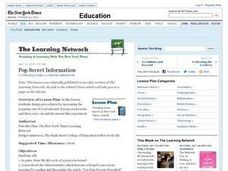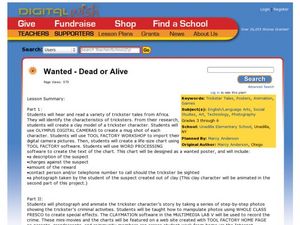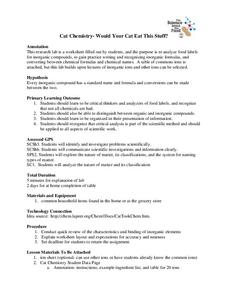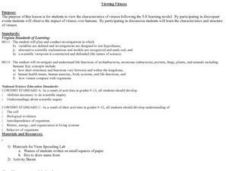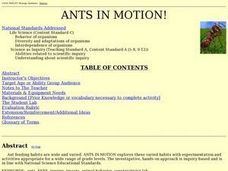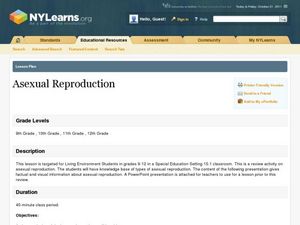Curated OER
Emerging Viruses
Students study the characteristics of living things and explore the characteristics of viruses including their structure, function, and reproductive cycles. They also explore the impact of viruses on human health by discussing common...
Curated OER
Survival of the Fittest
Sixth graders create their own "never before seen" marine creatures and examine how not all creatures in the sea swim, not all have sharp teeth
Curated OER
Introduction to Scientific Illustration
Seventh graders draw scientific illustrations in the lab. In this life science lesson, 7th graders discuss the importance of drawing in science experiments. They differentiate scientific drawing from basic art.
Curated OER
Pop Secret Information
Students design procedures for increasing the popping rate of a set amount of popcorn kernels. They propose and test a "secret" addition to the corn popping procedure which they expect would increase the popping rate and then write lab...
Curated OER
Hawaii's Freshwater Animals - Species Report
Students explore biology by creating a report for the class. In this oceanography lesson, students research and identify the survival characteristics of a list of freshwater animals by utilizing the Internet and library. Students...
Curated OER
Wanted- Dead or Alive
Students identify the characteristics of trickster tales. In this literary genres lesson, students read trickster tales from Africa and create a clay model of a trickster character. Students design a "wanted" poster with a description of...
Curated OER
GPS Ecosystem (Ecotone) Scavenger Hunt
Students describe the characteristics of an ecotone. In this ecotone lesson, students pick out their area and describe the visual appearance, conditions, ecosystem, biodiversity, predators, prey, and trees in their ecotone. They create a...
Curated OER
Science: Bees: An Interdisciplinary Approach
Students investigate the world of bees and describe their characteristics. by identifying the bees' parts, they demonstrate how these parts function. In the lab, students dissect bees and view the various parts under microscopes. ...
University of Georgia
Would Your Cat Eat This Stuff?
Processed foods use inorganic compounds for flavoring and preservation. This take-home laboratory challenges scholars to find 20 different compounds identified on the labels of foods to list on their data collection sheet. The activity...
Curated OER
Cells, The Structural and Functional Units of Life
High schoolers observe the general structure and organelles of plant and animal cells. Students prepare microscope slides of elodea, onion, check, and cork and identify the cells by size and shape as unicellular, multicellular, plant or...
Curated OER
The Six Kingdoms
In this classification worksheet, learners complete a chart listing the characteristics of each of six kingdoms. They write definitions for three terms.
Curated OER
Viewing Viruses
Students view the characteristics of viruses following the 5-E learning model. By participating in discrepant events Students observe the impact of viruses over humans. By participating in discussion students examine the characteristics...
Curated OER
Channel Islands and the Surrounding Sea
Students examine the Channel Islands and identify its characteristics. They participate in activities to help them discover the islands history, geography and conservation efforts. They complete a worksheet to end the lesson.
Curated OER
Where Do I Belong?
Tenth graders study the diversity of life in the world. They classify and sketch organisms into the 6 kingdoms.
Curated OER
BIoluminescence
Students investigate the concept of bioluminescence. They use dinoflagellates in a lab situation to study photosynthesis. They conduct research into the concept using a variety of resources. Also the class is taken on a field trip to...
Curated OER
Ants In Motion
Pupils brainstorm ants and their characteristics in a class discussion. They observe the ants and answer question pertaining to their behavior; then they apply the scientific method in creating and investigating a problem.
Curated OER
Phases of Matter
Eighth graders practice using correct vocabulary and apply content knowledge related to phases of matter when answering questions about situations or observations from everyday life.
Curated OER
The pH scale
Students list the common properties of acids and bases. They classify substances as acids or bases, by using pH and litmus tests and are able to explain the pH scale. They participate in a lab activity which reinforce their understanding.
Curated OER
Dissect with Respect
Students, through exercises and discussions, examine ethics involved in the process of choosing and using laboratory animals, respect for the animal they dissect and how to behave in an ethical manner as they dissect various lab specimens.
Curated OER
Algae Experiments
Students describe the characteristics of algae. In this biology lesson, students perform a series of experiment to explore algae. They investigate the basic things algae need to survive.
Curated OER
All About Blood and the Heart (Human Body for Children)
In this anatomy worksheet, students learn about the heart and it's characteristics. Students monitor their heartbeat in an experiment and then answer a series of questions about what they found.
Curated OER
Asexual Reproduction
Sixth graders investigate how asexual reproduction produces single-parent offspring. They use plants and yeast to demonstrate vegetative propagation and budding in a laboratory. Students draw five different types of asexual reproduction.
Curated OER
Sort Laboratory Practice
Eighth graders sort animals according to certain physical characteristics. In this science lesson, 8th graders explain the reason for such classification. They complete a worksheet individually at the end of the lesson.
Alabama Learning Exchange
Plants, Soil and Nutrients
Young scholars conduct an experiment. They review how to use the scientific method to conduct an experiment with white carnations and food coloring. They create a hypothesis and test it to better understand how plants get nutrients,...





